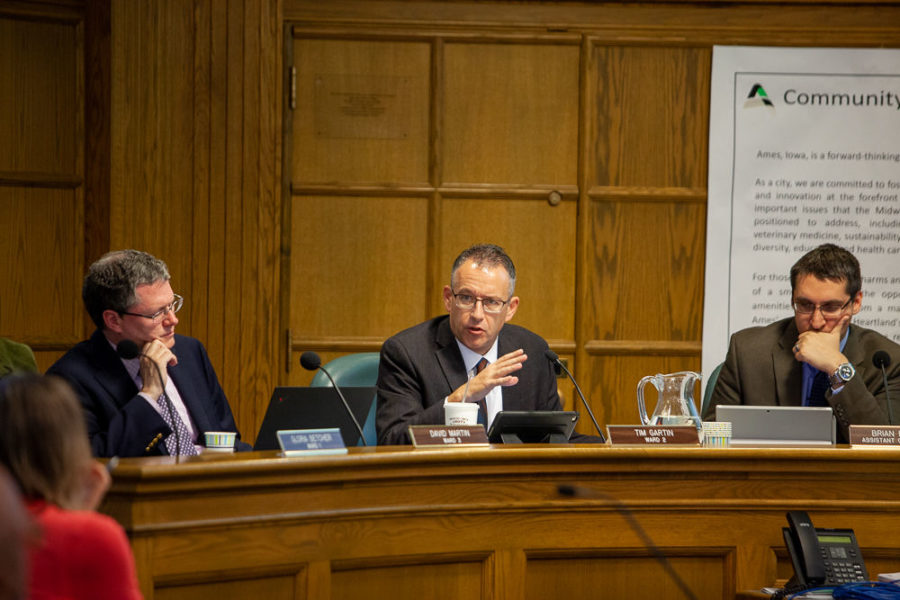Ames City Council approves vacation lodging ordinance, delays human trafficking ordinance due to complications
Ames City Council voted to repeal the existing mask ordinance effective May 28, and a resolution was passed to suspend enforcement of the ordinance until that time.
November 12, 2019
After 18 months of discussing, reviewing and analyzing a new chapter in the municipal code, the Ames City Council unanimously voted to enact legislation for vacation lodging effective December 1.
The guest lodging code, chapter 35, is the addition to the municipal code that will establish legal definitions, standards and enforcement procedures to license specific areas for vacation lodging. The Council voted to change the occupancy limit from 31 days to 30, as well as provide a setting fee of $50 to license areas for guest lodging.
The guest lodging code will be enforced March 1, 2020.
On the topic of safety, Ex-Officio Devyn Leeson said with all the events regarding racial issues including a Student Government adviser photo with his face painted black, the defacement of the Bean House in Geoffroy Hall, chalking and the protests that followed, the Council should take more action to improve diversity.
Leeson said in a recent Student Government meeting, students spoke how the events made them feel unsafe.
“There was a lot of voices, a lot of frustrations and the main theme was that people feel unsafe,” Leeson said “It’s not just people feeling unsafe on campus, it’s people feeling unsafe in the community where there’s an atmosphere for people of color, for people within the [LGTBQIA+] community, for people of many different backgrounds they feel unsafe […] I genuinely, genuinely want us, on the Council, to consider these harms.”
Councilwoman Gloria Betcher, 1st Ward representative, said she agreed with Leeson’s input the Council should provide training
“It is important that the students know that the Council supports them and we represent them,” Betcher said. “I would encourage everybody on council to take whatever opportunities you get to do some cultural competency training or whatever is offered.”
Leeson said the change starts with listening to students’ comments and their problems.
“It’s not just student issues, it’s community issues,” Leeson said. “It’s indicative of the larger Ames community and it’s indicative of problems that minorities […] face everyday. While this is not [a] very diverse council and many of the actions that happen don’t make us feel unsafe, hundreds — thousands of people feel unsafe every single day.”
In addition to promoting safety for the Ames community, a drafted ordinance council voted in favor of unanimously in August to regulate massage therapy businesses and prevent human trafficking was also discussed.
The ordinance would require businesses to produce information about their business and practitioners when demanded by the city.
Managers of the businesses must be Iowa residents, be designated in writing, be held responsible to provide information and be compliant, each practitioner should provide photo identification on display within the waiting and therapy rooms and they cannot provide massage services between midnight and 5 a.m., according to the document.
In the public hearing about the ordinance, Massage Heights Operation Director Doug Dollison said the license should be displayed in a public area rather than in waiting and therapy rooms. Dollison also said the ordinance should allow a 24-hour grace period for managers to fix any technical errors.
The Council voted to approve changes including the photo size for the license and define the purpose of preventing prostitution and human trafficking.
Due to complications within the city attorney’s office, the Council could not vote to amend this ordinance. Ames Mayor John Haila said despite the complications, the ordinance should take in affect in December.
Additionally, a climate action plan was presented with the incentive to provide a baseline of where the community is currently at with its energy efforts. The plan included providing a contract with a company that will monitor the city’s greenhouse gas inventory and forecast what will happen then provide recommendations.
The Council unanimously voted to approve the award to contract with paleBLUEdot for a community greenhouse gas inventory, forecasting and recommendations report at a cost of $24,960.







